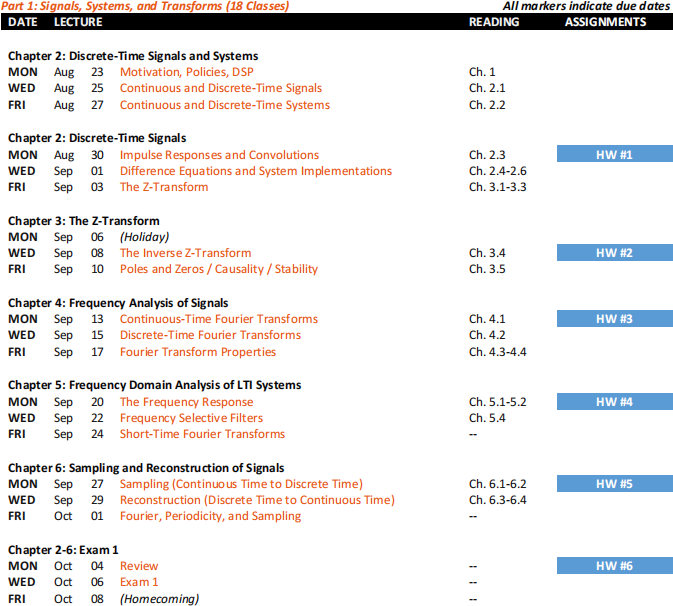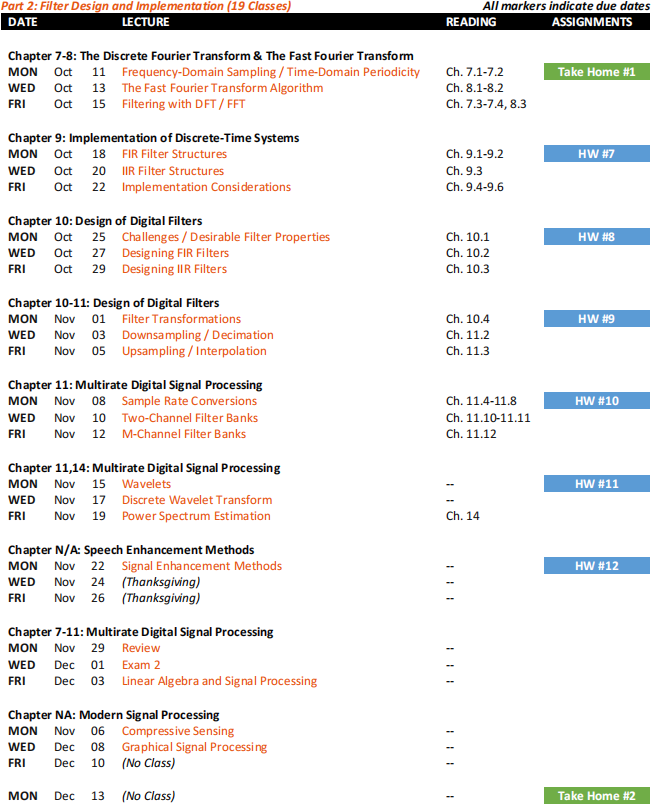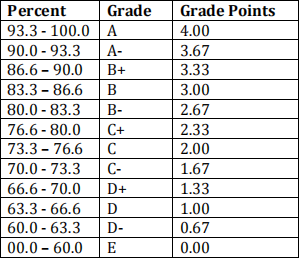关键词 > EEL4750/EEE5502
EEL 4750 / EEE 5502 Foundations of Digital Signal Processing
发布时间:2021-08-24
Hello, dear friend, you can consult us at any time if you have any questions, add WeChat: daixieit
Foundations of Digital Signal Processing
EEL 4750 / EEE 5502
Course Description
This course covers topics related to the foundations of digital signal processing. After completing this course, students should understand the essential properties of discrete-time signals and systems; understand the sampling and reconstruction of signals; be able to perform transform analysis of digital signals and systems and apply filter design techniques; as well as understand the fundamental principles of multi-rate signal processing.
Course Pre-Requisites / Co-Requisites
Prerequisite: EEL 3135 (Introduction to Signals and Systems) or equivalent
Course Objectives
At the conclusion of this course, you should be able to:
● Apply discrete-time systems to discrete-time signals
● Explain aliasing caused by under-sampling data
● Apply convolution and correlation to modify and locate signals
● Create a Fast Fourier transform algorithm
● Analyze data with the short-time Fourier transform / spectrogram
● Design FIR & IIR filters for modifying time-domain signals
● Analyze data with a multi-channel filter bank
Recommended Materials
● Digital Signal Processing, 4th edition
○ Authors: John G. Proakis and Dimitris K. Manolakis
○ Publisher: Prentice Hall, 2006
○ ISBN: 0131873741
● EEL 4750/EEE 5502 Course notes
○ Author: Joel B. Harley
Recommended Software
● MATLAB
Course Schedule
Part 1, Objective 1: Normalize Signals and Systems Knowledge
Since this is an introductory graduate course, you may start the class with a different signals and systems knowledge relative to other students. As a result, this half of the course aims to normalize knowledge across the class. Hence, parts of this half of the course may be a review of signals and systems material for you.
Part 1, Objective 2: Increase Depth of Signals and Systems Knowledge
While some topics may not be new for students, the course aims to give you a more in-depth, mature understanding of the theory and implementation of digital signal processing. This may require you to see old topics from new perspectives and with new mathematics.

Part 2, Objective 1: Design and Implement Filter Systems
In the second half of the course, we will design filter systems to satisfy specific requirements. Our focus will emphasize on stable, causal, linear phase filter systems that remove and retain specific frequencies. We will also briefly investigate how to design filter with other phase or magnitude requirements.
Part 2, Objective 2: Multi-Resolution Signal Processing
The final part of the course will delve into multi-resolution signal processing (i.e., filters operating at multiple sampling rates). These systems allow us to simultaneously process data at both coarse and fine timescale. This allows far more flexible capabilities than what available to typical filtering techniques.

Attendance and Participation Policies
Attendance & Participation:
While attendance is not graded, lectures will include regular homework help and in-class discussions and demonstrations on the subject material. While participation is not graded, it is an integral part of each class that can help you learn the material.
Slack Page:
We have a Slack page for the course: https://uf-eee5502-fa2021.slack.com/. This is an optional resource for students to discuss the course amongst each other and occasionally with the Professor and TAs. This resource is intended to supplement office hours and student interactions. No official communication / submission happens over Slack. No assignments submissions will be accepted over Slack.
Online Course Recording:
Our class sessions may be audio visually recorded for students in the class to refer back and for enrolled students who are unable to attend live. Students who participate with their camera engaged or utilize a profile image are agreeing to have their video or image recorded. If you are unwilling to consent to have your profile or video image recorded, be sure to keep your camera off and do not use a profile image. Likewise, students who un-mute during class and participate orally are agreeing to have their voices recorded. If you are not willing to consent to have your voice recorded during class, you will need to keep your mute button activated and communicate exclusively using the "chat" feature, which allows students to type questions and comments live. The chat will not be recorded or shared. As in all courses, unauthorized recording and unauthorized sharing of recorded materials is prohibited.
Evaluation Methods and Criteria
The following section discusses the policies for each of the graded assessments in this course. You should look here first for answers to any general, course-related inquiries.
Homework (12 in total)
When: Assigned roughly once a week (see course schedule).
What: Three parts: (1) Analytical problems that can be solved by hand, (2) theory assignments that can be solved by hand, and (3) implementation problems solve thru MATLAB.
Why: Homework guides you through course material and presents you with questions that will require time to think about and complete. Homework assignments are not meant to be completed in a single day.
Grading: Each of the three homework parts is graded separately. Homework is graded on a scale from 0 to 10. How points are assigned will vary with the assignment.
Late policy: Late assignments can be submitted one day late and can receive a maximum grade of 8/10. Assignments will not be accepted after one day. This policy allows us to post solutions before an exam.
Submission: Homework will be submitted on canvas before class (4:00 PM) on the due date. Please ensure that your submission is readable.
In-Class Exams (2 in total)
When: There are two non-cumulative exams covering each part of the course and one cumulative final exam.
What: Questions will be similar to homework concept problems
Why: Exams are an opportunity to show what you know about the course
Calculators/Open Book: Exams will be open book but time constrained, so do not rely on them
Grading: Exams are graded on a 100-percentage scale.
Final/Makeup exams: Each part of the final exam acts as a re-take or make-up exam. If you perform poorly on an in-class exam, you will have the opportunity to take one or more final exam parts to replace your grade(s). You will receive the highest grade from each midterm/final part pair.
Take-Home Exams (2 in total)
When: There are two non-cumulative exams covering each part of the course and one cumulative final exam.
What: Questions will be similar to homework implementation problems
Why: Exams are an opportunity to show what you know about the course.
Calculators: No calculators are allowed or necessary
Grading: Exams are graded on a 100-percentage scale.
Late policy: Late take-home exams will receive a 0 grade. Please turn everything in on time.
Evaluation of Grades

Grading Policy

Course & University Policies
Modifying Syllabus by Class Vote
When: If you and/or other students believe the course would be improved by a change in the syllabus and I agree that it would be a reasonable change. What: The proposed change will be put to an anonymous vote with the entire class. If the majority of the class agrees to this change, it becomes part of the syllabus. Why: In previous years, changes to the syllabus have been necessary due to unforeseen consequences of certain policies. The class vote ensures the entire class agrees with the change.
Collaboration
Healthy collaboration: To solve homework assignments, healthy discussion and collaboration amongst classmates is encouraged. Healthy collaboration includes:
● Discussing and explaining general course material
● Discussing assignments for better understanding
● Providing assistance for general programming and debugging issues
If another student contributes substantially to your understanding of a problem, you should cite this student to let myself and the teaching assistants be aware of your similar interpretations of a problem. You will not be judged negatively for citing another student.
Cheating and plagiarism: While collaboration is encouraged, you are expected to submit your own work. Submitting work completed by another student is considered plagiarism and will be dealt with according to university policy. In general, if you do not fully understand your solution, the work is not your own. Examples of plagiarism or cheating include:
● Copying (or allowing someone to copy), even partially, an assignment solution or program from the course
● Submitting material, particularly code, using material taken from another source without proper a citation
● Obtaining solutions to assignments or exams through inappropriate means
Note that I may elect to use a plagiarism detection service in this course, in which case you will be required to submit your work to such a service as part of your assignment.
Consequences: If you are suspected of dishonest academic activity, university policy to is immediately report the activity to the Student Conduct & Conflict Resolution office to have paper trails and ensure students receive fair representation. Once reported, the Student Conduct & Conflict Resolution office will review the report act on it.
Students Requiring Accommodations
Students with disabilities who experience learning barriers and would like to request academic accommodations should connect with the disability Resource Center by visiting https://disability.ufl.edu/students/get-started/. It is important for students to share their accommodation letter with their instructor and discuss their access needs, as early as possible in the semester.
Course Evaluation
Students are expected to provide professional and respectful feedback on the quality of instruction in this course by completing course evaluations online via GatorEvals. Guidance on how to give feedback in a professional and respectful manner is available at https://gatorevals.aa.ufl.edu/students/. Students will be notified when the evaluation period opens, and can complete evaluations through the email they receive from GatorEvals, in their Canvas course menu under GatorEvals, or via https://ufl.bluera.com/ufl/. Summaries of course evaluation results are available to students at https://gatorevals.aa.ufl.edu/public-results/.

